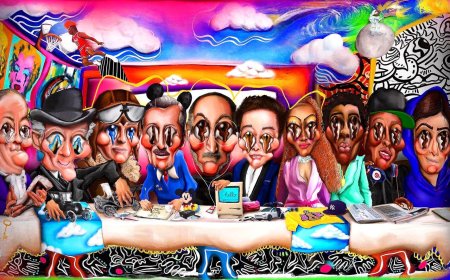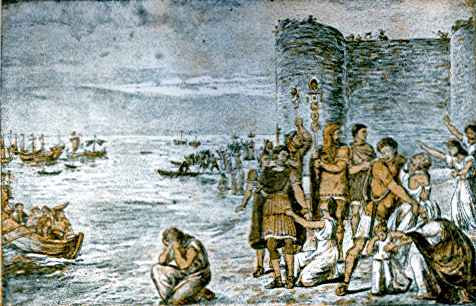Why Christmas Is Celebrated on December 25: History, Origins, and Traditions"
"Discover why Christmas is celebrated on December 25. Learn about its history, origins, and traditions that have shaped this global holiday."

The selection of December 25 as the date for Christmas is a topic deeply rooted in historical, religious, and cultural contexts, reflecting the complex interplay between early Christianity and existing pagan traditions. Traditionally, it is believed that the early Church chose this date to coincide with the Roman winter solstice festival known as dies Natalis Solis Invicti, or the "Birthday of the Unconquered Sun," which was celebrated as early as 274 AD.[1]
This strategic decision not only provided a Christian alternative to popular pagan festivities but also symbolically aligned the birth of Jesus with the return of light, reinforcing his theological significance as the bringer of salvation amidst winter's darkness.[2][3]
Despite its widespread acceptance, the choice of December 25 has sparked nu- merous debates among scholars. Some theories suggest that the date corresponds to the Annunciation, when Mary was told she would conceive Jesus, while others emphasize connections to the timing of John the Baptist's birth, which, according to
Additionally, discussions around the influence of pre-Christian customs, such as the Germanic festival of Yule, further complicate the narrative, illustrating the blending of pagan and Christian elements in the evolution of Christmas traditions.[1][6]
Modern interpretations vary, with some scholars advocating for the date's pagan roots, while others argue for its purely theological underpinnings, highlighting the ongoing discourse regarding cultural adaptation in religious observance.[7][6] This multifaceted dialogue underscores the significance of December 25 not only as a religious holiday but also as a cultural event that has shaped customs and practices worldwide.
As Christmas evolved, it became a pivotal moment for social cohesion and economic activity, transcending its religious origins to embrace a diverse array of cultural expressions. The holiday now serves as a catalyst for communal bonding and festive celebration, encompassing traditions that range from gift-giving to elaborate feasts, thereby solidifying its place as a major cultural and economic phenomenon in many societies today.[6][8]
Historical Context
The selection of December 25 as the date for Christmas has deep historical roots, entwined with both Roman pagan traditions and early Christian practices. The 'history of religions' or 'substitution' theory posits that the Church adopted December 25 to coincide with the Roman winter solstice festival, known as the dies Natalis Solis Invicti (the birthday of the Invincible Sun), which has been celebrated since 274 AD. This festival followed the joyful week of the Saturnalia (December 17–23), a time characterized by feasting, gift-giving, and merriment in Roman society[1]. While the specific connection between Christmas and the Sol Invictus festival remains debated among scholars, it illustrates a broader trend of cultural adaptation as Christianity sought to establish itself within the Roman Empire.
Prior to the formal celebration of Christmas, early Christians primarily focused on the celebration of Easter, with little attention given to the nativity of Jesus. The earliest records suggest that there was significant interest in identifying the date of Jesus's birth by the end of the second century, driven in part by theological debates regarding his humanity[9]. By the early fourth century, two primary candidates emerged for the date: December 25 and January 6. Ultimately, December 25 became the established date for Christmas, while January 6 was designated for the celebration of Epiphany, which commemorates the manifestation of Christ to the Gentiles[9].
Additionally, the pre-Christian Germanic festival known as Yule, celebrated by groups such as the Anglo-Saxons and Norse, contributed elements to the Christmas tradi- tion. Yule festivities included customs that are still prevalent today, such as the Yule log and various Yule beings[1]. The long-bearded god Odin, referred to as "the Yule one" in Old Norse texts, further illustrates the blend of pagan and Christian traditions that characterized the holiday's evolution.
As Christianity gained prominence, the Church employed strategies of cultural inte- gration to attract new followers. The choice of December 25 was not only a practical adaptation to existing pagan festivals but also a theological alignment. Early Christian writers frequently used light as a metaphor for Christ, reinforcing the connection between Jesus and the solstice celebration of the return of light following the darkest days of winter[2]. This alignment facilitated the acceptance of Christmas among converts, ultimately establishing it as a cornerstone of Christian celebration and identity.
Religious Interpretations
The selection of December 25 as the date for Christmas has been the subject
Theological Significance of Light
Theological interpretations often emphasize the metaphor of light associated with Jesus, who is seen as the bringer of salvation. Early Christian texts reference light as a symbol of hope and divine presence, with scriptures such as Isaiah 9:2 and John 1:5 underscoring this association. As a result, December 25, near the winter solstice, naturally aligns with celebrations of light amidst darkness, reinforcing the theological significance of the Nativity[2].
Connections to John the Baptist
Another religious interpretation derives from the connection between the birthdays of Jesus and John the Baptist. According to the Gospel of Luke, John was born ap- proximately six months prior to Jesus. This interpretation suggests that if John's birth were celebrated in June, then Jesus's birth would logically fall around December, further supporting the December 25 date[4][5].
Debates on Pagan Influences
The choice of December 25 has also sparked debates regarding potential pagan influences, particularly the Roman festival of Sol Invictus and the cult of Mithras. Some scholars argue that early Christians may have adopted this date to provide a Christian alternative to these pagan celebrations, thereby facilitating the transition of cultural practices into Christian observance. Pope Benedict XVI addresses this issue, noting that while such theories existed, they do not account for the early Christians’ intrinsic motivations to celebrate Christ’s birth on this date[7][5].
Diverse Scholarly Perspectives
Modern scholarship offers varied interpretations of the reasons behind choosing December 25. While some scholars view it as a response to existing pagan traditions, others argue for a purely theological reasoning rooted in early Christian belief systems. This ongoing discourse reflects the complexity of cultural adaptations and their impacts on the development of Christian observances over time[2][5].
Cultural Impact
The selection of December 25 as the date for Christmas has significantly influenced various cultural traditions and practices surrounding the holiday. The alignment of this date with pre-existing winter solstice celebrations has allowed Christmas to become a focal point for both religious and secular observances across different cultures[6]. This adaptation has resulted in a rich tapestry of customs that reflect local values, beliefs, and communal identities.
Historical Context
The choice of December 25 is thought to have been influenced by the Roman festival of Saturnalia, which celebrated the winter solstice with feasting, gift-giving, and merriment. Many of the customs associated with Christmas today, such as the exchange of gifts and festive gatherings, echo those earlier traditions[10]. The
integration of these practices into Christmas celebrations allowed the early Church to facilitate the conversion of pagans by providing a familiar framework for their winter festivities, which in turn helped solidify the holiday's significance within Christian doctrine[2].
Economic Significance
Beyond its cultural roots, Christmas has substantial economic implications. The holiday season generates a significant boost in retail sales and tourism in many countries, turning it into a crucial time for businesses[6]. The traditions of gift-giving and holiday decorations contribute not only to individual expressions of joy but also to the economic vitality of communities, as people travel and spend to partake in the festivities[6].
Social Cohesion and Community Identity
Christmas traditions also serve as a means of fostering social cohesion and com- munity identity. As families and friends gather to celebrate, the holiday becomes a moment of unity, transcending individual differences and reinforcing communal bonds. The emphasis on love, generosity, and hope during this time resonates
Additionally, many cultural expressions associated with Christmas, such as music, food, and artistic performances, reflect the diversity of global celebrations. These varied practices highlight the ways in which communities preserve their cultural heritage while simultaneously engaging with broader traditions, creating a unique blend of customs that enrich the holiday experience[6][8].
FAQs
1. What is the origin of the December 25 Christmas celebration?
The celebration of Christmas on December 25 dates back to the early Christian Church. While the Bible does not provide a specific birth date for Jesus, early Christians sought to establish a date for celebrating His birth. By the 4th century AD, Pope Julius I officially declared December 25 as the date for Christmas, possibly to align with existing Roman festivals and to provide a Christian alternative to pagan celebrations.
2. What is the story behind Christmas?
Christmas commemorates the birth of Jesus Christ, who is regarded by Christians as the Son of God and Savior of the world. The story is mainly found in the Gospels of Matthew and Luke in the Bible, which describe how Jesus was born to the Virgin Mary in Bethlehem, placed in a manger, and visited by shepherds and wise men. The event signifies hope, peace, and salvation for humanity.
3. Does the Bible say Christmas is December 25?
No, the Bible does not mention December 25 as Jesus’ birthdate. The Gospels provide details about His birth but do not specify a date. The choice of December 25 was made later by Church leaders for theological and practical reasons.
4. Why do people say Jesus was not born on December 25th?
Many historians and theologians believe that Jesus was not born in December, citing reasons such as:
- Shepherds in the fields: Luke 2:8 states that shepherds were tending their flocks at night, which was uncommon during the cold winter months in Israel.
- Roman census timing: The Roman census, which required people to return to their hometowns, was more likely conducted in warmer months rather than winter.
These clues suggest that Jesus might have been born in spring or early autumn, but the exact date remains uncertain.
5. What’s the original origin for December 25?
December 25 was originally associated with pagan Roman festivals, including:
- Sol Invictus ("The Unconquered Sun"): A festival celebrating the sun god, which marked the winter solstice and the lengthening of daylight.
- Saturnalia: A Roman festival honoring Saturn, featuring feasting, gift-giving, and merrymaking.
Early Christians may have chosen this date to replace these pagan traditions with the celebration of Christ, the Light of the World (John 8:12).
6. Who declared December 25th Jesus' birthday?
Pope Julius I, around AD 350, officially designated December 25 as the celebration of Christ’s birth. The date was later reinforced by Emperor Constantine in AD 336, making it widely recognized within the Roman Empire.
7. Why did the Catholic Church make Christmas on December 25?
The Catholic Church likely chose December 25 to:
- Provide a Christian alternative to pagan celebrations.
- Symbolize Jesus as the "Light of the World", replacing the worship of the sun.
- Establish a universal date for the celebration of Christ’s birth.
This decision helped in spreading Christianity throughout the Roman Empire.
8. When was Jesus’ actual birthday?
Jesus' actual birthdate is unknown, but scholars estimate it could have been between 4–6 BC, based on historical events like the reign of King Herod (who died in 4 BC) and the Roman census mentioned in the Gospel of Luke. Some believe September or early spring is a more likely time.
9. What does the Bible say about celebrating Christmas?
The Bible does not mention Christmas or command its observance. However, it does encourage celebrating Jesus’ birth and His significance (Luke 2:10-14, Isaiah 9:6). Some Christians emphasize that while the holiday itself is not Biblical, its message of peace, joy, and salvation aligns with Christian teachings.
10. Who was released on December 25 in the Bible?
There is no direct mention of anyone being released on December 25 in the Bible. However, during Jesus’ trial, the Roman governor Pontius Pilate allowed the crowd to choose between releasing Jesus or the criminal Barabbas. The people chose Barabbas (Matthew 27:15-26).
11. What is the true meaning of Christmas in the Bible?
Biblically, Christmas represents:
- The birth of Jesus (Luke 2:10-11)
- The fulfillment of prophecy (Isaiah 7:14)
- God’s gift of salvation (John 3:16)
- Joy, peace, and goodwill (Luke 2:14)
For Christians, it is a time to reflect on God’s love and the hope brought through Jesus Christ.
12. Is December 25 a pagan holiday?
December 25 was originally a pagan holiday celebrating the winter solstice, but the Church redefined its meaning to commemorate Christ’s birth. While some elements of modern Christmas (like tree decorations and gift-giving) have pagan roots, the focus of Christian Christmas remains on Jesus Christ.
13. What is the story behind "A Christmas Story"?
If referring to the classic movie A Christmas Story (1983), it is a humorous holiday film about a boy named Ralphie Parker, who dreams of receiving a Red Ryder BB gun for Christmas. However, in a religious sense, the Christmas story refers to Jesus' birth as described in the Gospels of Matthew and Luke.
14. What is the main reason for celebrating Christmas?
The main reason for Christmas is to celebrate the birth of Jesus Christ, who Christians believe is the Messiah and Savior. The holiday also promotes family, generosity, love, and gratitude.
15. What is the full meaning of Christmas?
The word Christmas comes from “Christ’s Mass”, referring to a church service honoring Christ’s birth. The full meaning encompasses:
- Spiritual significance: Celebrating Jesus as the Savior of the world.
- Love and giving: Reflecting on God’s greatest gift—Jesus Christ.
- Family and joy: Strengthening relationships and spreading goodwill.
References
[1] : Christmas - Wikipedia
[2] : The Neglected Meaning of Advent - Desiring God
[3] : 25th of December: The origins of Christmas and its potential ... [4]: Why Christmas is on December 25th? · Living Theologically [5]: Why do we Celebrate Christmas on December 25th?
[6] : Why Is Christmas on December 25? - Medium
[7] : Why is Christmas on December 25? - Catholic Answers [8]: The Meaning of Christmas Traditions in Different Cultures
[9]: The Influence of Roman Mythology on Modern-Day Rituals and Festivals [10]: Here’s why the winter solstice is significant in cultures ... - PBS







































